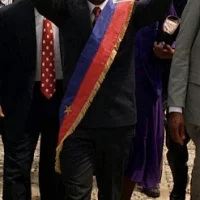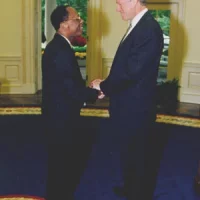Grocery stores throughout the United States pulled tons of grapes from their shelves when traces of cyanide were found in two grapes shipped from Chile to Philadelphia on March 13, 1989. The Commissioner of the Food and Drug Administration advised Americans to get rid of all fruit in their homes unless they were certain it was… Read More "Grapes of Wrath and Strained Relations with Chile"
The Technology of Terror – South America in the 70s and 80s
Terrorism the world over poses a threat to the lives of Foreign Service Officers. Throughout the 1970s and 1980s terrorist groups threatened the safety of FSOs serving in South America. In Argentina, two such groups, the People’s Revolutionary Army (ERP) and Montoneros, resorted to armed resistance 1969-1970 in response to the regime of Juan Carlos… Read More "The Technology of Terror – South America in the 70s and 80s"
Getting the U.S. President to Write to the President of Guatemala About Human Rights (Hint – It’s Who You Know)
With the end of the Cold War, the U.S. began to put greater emphasis on enforcing its policy of protecting human rights worldwide, based on the core belief that people have a set of inviolable rights simply on grounds of being human. Some foreign counterparts were skeptical that the U.S. would give priority to human… Read More "Getting the U.S. President to Write to the President of Guatemala About Human Rights (Hint – It’s Who You Know)"
Negotiating the Mexican-American Border: the Case of Chamizal
Defining the border between Mexico and the United States has not always been in the hands of politicians; at one point, a shift in the Rio Grande River created a new boundary and generated a diplomatic dispute. In February 1848, the Treaty of Guadalupe-Hidalgo ended the Mexican-American War and designated the Rio Grande the boundary… Read More "Negotiating the Mexican-American Border: the Case of Chamizal"
Drogas y Derechos Humanos: Changing U.S. Policy towards Guatemala
In June 1954 the U.S. Central Intelligence Agency, concerned about the threat of communism in Guatemala, assisted in the overthrow of the government led by President Jacobo Arbenz Guzmán. A five-member junta assumed power. Following communications with Guatemala’s Foreign Ministry and consultations with countries in Central America, the U.S. determined that the new Guatemalan government… Read More "Drogas y Derechos Humanos: Changing U.S. Policy towards Guatemala"
Haiti has long been plagued by coups d’état and regime changes, leading to long-time political instability and weak governance. In this volatile political field, it was easy for a Haitian leader to assume dictatorial powers, as was the case with President François Duvalier, also known as “Papa Doc.” After becoming the President of Haiti in… Read More "The Overthrow of Haiti’s Aristide"
Jesse Helms: The Senator Who Just Said No
Jesse Alexander Helms, a five-term Republican Senator (1973- 2003) from North Carolina, was known not only for his conservative beliefs but for the lengths he would go in support of them. A proponent of the conservative resurgence movement in the 1970s, Helms cherished his nickname: “Senator No,” granted for his obstructionist tendencies. As a member… Read More "Jesse Helms: The Senator Who Just Said No"
The Panama Riots of 1964: The Beginning of the End for the Canal
When President Theodore Roosevelt signed the Hay-Bunau-Varilla Treaty with Panama in 1903, the United States gained sovereignty over the portion of the newly formed country of Panama which would become the Panama Canal, a modern-day marvel that revolutionized international shipping and solidified America as a global power. While the benefits to the U.S. were enormous, the politics… Read More "The Panama Riots of 1964: The Beginning of the End for the Canal"
The United States found itself embroiled in several interventions in the 1990s that focused on upholding basic human rights standards and encouraging democratic regimes to flourish, from Somalia to the Balkans to America’s own backyard in the Caribbean. Despite Haiti being the second nation in the Western Hemisphere to proclaim independence, it has suffered from… Read More "“The World Was Tired of Haiti”: The 1994 U.S. Intervention"
Sports Boycotts
Sport has often been used throughout history as a political tool. In particular, sport boycotts have been effective measures for countries to express disdain and condemnation for the actions of another. In the last half of the 20th Century, the more famous boycotts were imposed as a response to apartheid policies in South Africa during… Read More "Sports Boycotts"


